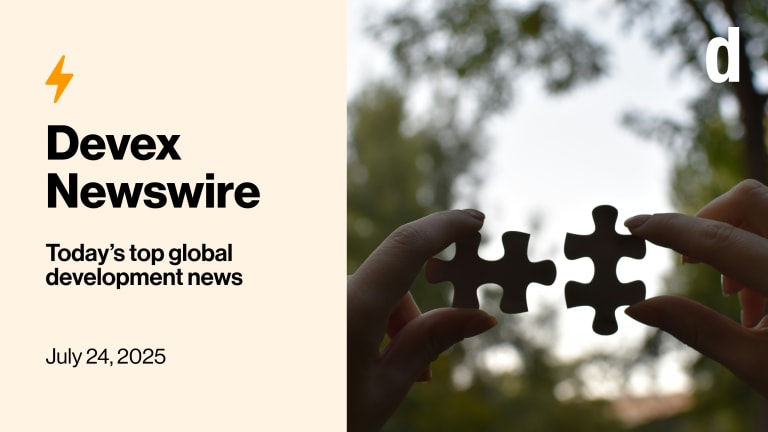
This is a preview of Newswire
Sign up to this newsletter for an inside look at the biggest stories in global development, in your inbox daily.
One year after George Floyd’s killing, it’s been striking to me, as a Minnesota native, to see how the needless death of yet another Black man by police has not only profoundly changed the community I grew up in, but the entire world.
Floyd’s murder has also spurred a reckoning in global development, a sector long accused of harboring colonial tendencies and white savior attitudes. Many development and humanitarian groups have been forced to come to terms with how they’re falling short on racial equity in their own programming and the communities they serve, and within their own organizations.
On Tuesday, a special inquiry on racism in the aid sector told members of the U.K. Parliament’s International Development Committee that the country must face up to how its development budget cuts will impact people of color around the world.
“Who is making the decisions about cuts that will mean school places that were promised will not be funded, that skilled birth attendants who were promised will not be there, and which racial groups and which people will feel the consequences of those decisions?” asks Lorriann Robinson, co-founder of the Equity Index, which researches racial inclusivity in the U.K. development sector.
Do the work
While many development organizations embarked on a self examination of their own diversity, equity, and inclusion efforts after Floyd’s killing, many of those efforts have stalled because “our toolboxes are inadequate for that job,” writes an advisory member of Healing Solidarity, a group focused on reimagining the international aid and philanthropy sector.
“Organizational leadership must make time, and consciously give energy and room for consent, disagreement, for discernment between options, failure, celebration, confusion, grief, and repair. Anti-racist practice requires all of these things,” Jennifer Lentfer writes in this op-ed.
“Fundamentally changing our ways of working means slowing down and paying more deliberate, devoted attention to the culture we are building, not just the strategies and plans we make.”
Opinion: How to get your organization's anti-racism work unstuck
The latest from WHA
Our team continues to follow all the happenings at this week’s World Health Assembly. Catch up on what you’ve missed:
• Germany, the United States, and Japan have called for a second phase of research into the origin of COVID-19 after an initial report was inconclusive.
• Health experts welcome recommendations made by the Independent Panel for Pandemic Preparedness and Response but caution that political leadership and advance planning will be essential.
• mRNA technology could lead to breakthroughs in global health, but seeing success like that beyond COVID-19 vaccines could be difficult.
+ Tune into our panel discussion — Vaccine rollouts on the African continent — and more live coverage from 9 a.m. ET.
The joy of flex
“For many years, WHO has been given new tasks without sufficient authority or resourcing to undertake them fully. It can’t do everything.”
— Helen Clark, former prime minister of New Zealand and co-chair of the Independent Panel for Pandemic Preparedness and Response92% of WHO’s COVID-19 funds for next year are earmarked rather than flexible, a huge jump from 70% last year. That rigidity — combined with a huge funding shortfall — may make it impossible for the organization to do its job, according to the executive director of its emergencies program.
Read: WHO official says earmarked funding risks ‘paralyzing’ agency
Turmoil in Mali
There has been a second coup in Mali after the country’s acting vice president seized power on Tuesday from the interim president and prime minister. The overthrow seems to have been precipitated by a government Cabinet reshuffle that took place Monday, which left two members of the military junta — which installed itself last August — out in the cold.
Mali, which also experienced a coup in 2012, has seen an increase in the extremist violence that has plagued the wider Sahel region, causing mass displacement. An estimated 326,000 people were internally displaced in Mali as of the end of 2020, and the government’s inability to respond to the needs of its population is thought to have fed recruitment for extremist organizations that have been attacking civilians.
In other news
U.S. Secretary of State Antony Blinken on Tuesday announced a new aid package for Palestinians, including $75 million for economic development and $32 million for UNRWA. [Politico]
Aid donors and NGOs have expressed concern over Ghana's crackdown on sexual minorities following last week's arrest of 21 people for promoting LGBT+ rights. [Reuters]
Australia will shutter its Kabul embassy in Afghanistan, citing heightened security concerns. [BBC]








